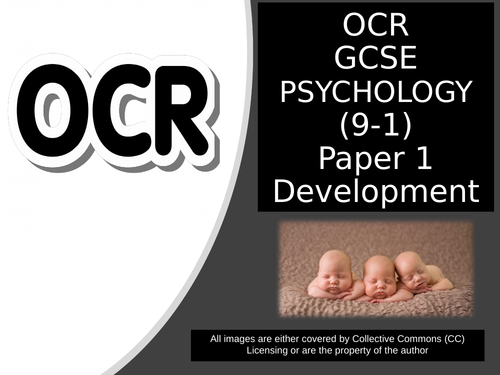
OCR GCSE Psychology (9-1): Development
Paper One: Studies and applications in psychology
Covers:
Stages of development; pre-natal; childhood; adolescence; and adulthood
The development of brain structures and functions; the nervous system; neurons; synapses; and their interaction in development of the brain
IQ tests as a measure of intelligence.
Theories/Explanations
Piaget’s Theory of Cognitive Development
The Role of Learning on Development –
Dweck’s Mindset Theory
Willingham’s Learning Theory
Piaget’s Theory of Cognitive Development:
The four invariant stages of development: sensori-motor; pre-operational; concrete-operational; formal operational assimilation and accommodation
The concepts of object permanence; animism; and egocentrism
The processes of decentration; reversibility; and conservation
Criticisms of the theory including the reductionism/holism debate.
Cognitive Development Research Study – Piaget (1952): Study into the conservation of number.
Learning theories of development:
Dweck’s ideas on fixed and growth mindsets
Dweck’s ideas on praise for effort
Willingham’s ideas on the myth of learning styles
Willingham’s ideas on the importance of meaning for learning
Criticisms of learning theories including the nature/nurture debate
Learning Research Study – Blackwell et al. (2007): study into fixed and growth mindsets.
Application: The changing role of education
How Piaget’s ideas have been applied to education through the use of key stages, readiness, active learning and the concept of intelligence
How learning theories apply to the development of education and intelligence through growth mindsets and teaching through meaning not learning styles
Consists of an extensive PPT display (120 slides) giving clear and full coverage of the module.
The presentation has teaching comments where suitable, exam style questions, activities to encourage thinking and links to resources.
Content aims to be additional to the textbook.
Complete coverage of this module, just ‘pick up and go’… suitable for both new and experienced teachers
You are welcome to amend, expand or reduce the display to suit your needs.
I HAVE USED THIS RESOURCE IN THE CLASSROOM
Copying this resource for sharing or personal profit, is against copyright.
IF YOU PURCHASE THIS RESOURCE, FEEDBACK IS REALLY APPRECIATED AND HELPS ME TO AMEND AND IMPROVE (YOU AUTOMATICALLY RECEIVE UPDATES) …. Thanks
The experienced author:
Andy McCarthy (amac education: Psychology) is a Chartered Psychologist, experienced teacher, lecturer and publisher.
Get this resource as part of a bundle and save up to 29%
A bundle is a package of resources grouped together to teach a particular topic, or a series of lessons, in one place.
Something went wrong, please try again later.
This resource hasn't been reviewed yet
To ensure quality for our reviews, only customers who have purchased this resource can review it
Report this resourceto let us know if it violates our terms and conditions.
Our customer service team will review your report and will be in touch.
